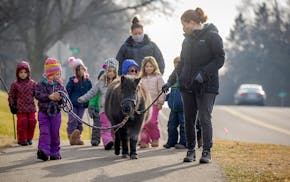DULUTH – The Duluth City Council has unanimously rejected an appeal of a decision to permit a car-sleeping program for homeless people in a residential neighborhood, allowing it to reopen immediately.
Vineyard Church in the northern Kenwood neighborhood offered to host the seasonal Safe Bay program this year in its wooded back parking lot, with space tight at the program's former downtown site. The city's Planning Commission approved a permit for the program at Vineyard, which ran for 10 days there before a group of neighbors appealed the decision and forced the city to shut down the program last month.
Hundreds have weighed in with city officials largely in support of Safe Bay, which for two years has offered a secure place for people to park, shower and sleep from May through October.
But some neighbors who live on a road behind Vineyard Church have opposed it, citing fears about trespassing, crime, privacy and litter. They weren't satisfied with screening that was installed to block the view of the lot from their properties. The closest home is 250 feet from the parking lot.
The council's job is to "make sure no rules were broken" and to ensure city code has been met, City Councilor Roz Randorf said before the vote. "We can check that box."
The appeal, filed by several neighbors, argued that the Planning Commission's decision violated city code related to the type of fencing required for an outdoor-living permit and the number of available toilets, among other allegations.
Attorney Brenda Miller spoke Thursday night on behalf of the neighbors, accusing the city of waiving rules for causes and friends. She said her clients had been vilified and labeled as "anti-homeless," when they were really being "active and engaged citizens."
"This is about your Planning Commission passing a permit that they knew did not meet city code," said Darrin Phillips, one of the appellants. "This is not about NIMBY."
The city's Planning and Economic Development director, Ben VanTassel, wrote in a letter to the council that he found no code violations.
Several spoke in favor of the program, including some of its participants.
Travis Lenander said he pays taxes and works full-time. "I'm doing everything in my power to put a roof over" the heads of his children and wife, staying in a shelter, he said.
Outreach worker David McComas-Bussa said he didn't believe neighbors hired an attorney because of rules and fencing.
"You do it because you're scared, and there is a deep fear of other people," he said. "But the way to face that fear is to go out in the community and meet people to become part of the solution."
Duluth police data show a handful of calls related to Safe Bay during its two years of operation. Only one resulted in a citation or arrest, which was for drinking and driving.
The Safe Bay program stems from Stepping On Up, a coalition of Duluth organizations taking on chronic homelessness, and is operated by the Chum emergency shelter. Duluth, which has a population of 87,000, has 200 shelter beds and the city's warming shelter operates seasonally. More than 700 people in the city were counted as homeless in 2024.
The Safe Bay program is capped at 50 cars, but its highest number so far has been 22. Participants are often victims of domestic violence, working or going to school, or in addiction recovery. Proponents say it works, and a large percentage of its users have found housing.
The Planning Commission will review the permit annually for renewal.
Supreme Court allows DOGE team to access Social Security systems with data on millions of Americans
Feeding Our Future probe: Apple Valley woman charged with defrauding food program of $1.4 million

Thompson found guilty of murder in car crash that killed 5 young women

University of Minnesota is putting its golf course up for sale

